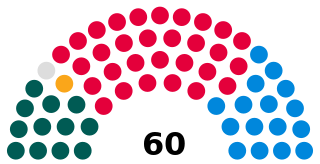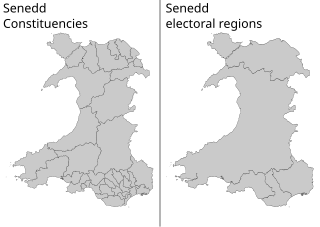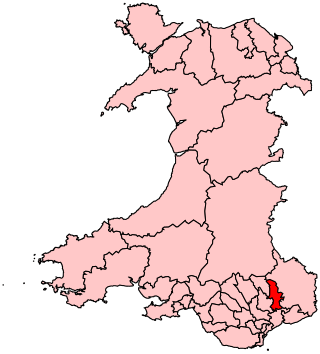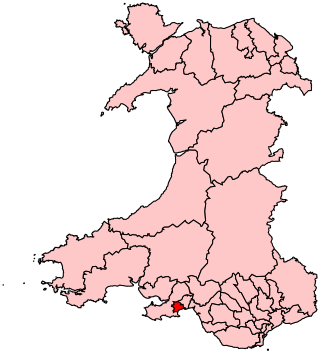
The additional-member system (AMS) is a mixed electoral system under which most representatives are elected in single-member districts (SMDs), and the other "additional members" are elected to make the seat distribution in the chamber more proportional to the way votes are cast for party lists. It is distinct from parallel voting in that the "additional member" seats are awarded to parties taking into account seats won in SMDs, which is not done under parallel voting.

A member of the Senedd is a representative elected to the Senedd. There are sixty members, with forty members chosen to represent individual Senedd constituencies, and twenty to represent the five electoral regions of the Senedd in Wales.

The Senedd, officially known as the Welsh Parliament in English and Senedd Cymru in Welsh, is the devolved, unicameral legislature of Wales. A democratically elected body, it makes laws for Wales, agrees to certain taxes, and scrutinises the Welsh Government. It is a bilingual institution, with both Welsh and English being the official languages of its business. From its creation in May 1999 until May 2020, the Senedd was known as the National Assembly for Wales.
Electoral systems of the Australian states and territories are broadly similar to the electoral system used in federal elections in Australia.

Since its establishment in 1947, Pakistan has had an asymmetric federal government and is a federal parliamentary democratic republic. At the national level, the people of Pakistan elect a bicameral legislature, the Parliament of Pakistan. The parliament consists of a lower house called the National Assembly, which is elected directly, and an upper house called the Senate, whose members are chosen by elected provincial legislators. The head of government, the Prime Minister, is elected by the majority members of the National Assembly and the head of state, the President, is elected by the Electoral College, which consists of both houses of Parliament together with the four provincial assemblies. In addition to the national parliament and the provincial assemblies, Pakistan also has more than five thousand elected local governments.
An electoral roll is a compilation that lists persons who are entitled to vote for particular elections in a particular jurisdiction. The list is usually broken down by electoral districts, and is primarily prepared to assist election officials at polling places. Most jurisdictions maintain permanent electoral rolls, which are updated continuously or periodically, while some jurisdictions compile new electoral rolls before each election. Electoral rolls are the result of a process of voter registration. In most jurisdictions, voter registration is a prerequisite for voting at an election. Some jurisdictions do not require voter registration, and do not use electoral rolls, such as the state of North Dakota in the United States. In those jurisdictions a voter must provide identification and proof of entitlement to vote before being permitted to vote.

In the United Kingdom (UK), each of the electoral areas or divisions called constituencies elects one member to the House of Commons.
A Commonwealth citizen is a citizen or qualified national of a Commonwealth of Nations member state. Most member countries do not treat citizens of other Commonwealth states any differently from foreign nationals, but some grant limited citizenship rights to resident Commonwealth citizens. In 16 member states, resident non-local Commonwealth citizens are eligible to vote in elections. The status is most significant in the United Kingdom, and carries few or no privileges in many other Commonwealth countries.

In the United Kingdom, a member of parliament (MP) is an individual elected to serve in the House of Commons, the lower house of the Parliament of the United Kingdom.

The Senedd constituencies and electoral regions are the electoral districts used to elect members of the Senedd to the Senedd, and have been used in some form since the first election of the then National Assembly for Wales in 1999. New boundaries were introduced for the 2007 elections and currently consist of forty constituencies and five regions. The five electoral regions are: Mid and West Wales, North Wales, South Wales Central, South Wales East, and South Wales West, with the forty constituencies listed below. Voting last took place in all districts in the 2021 Senedd election, and is not used for local government.

Blaenau Gwent is a constituency of the Senedd. It elects one Member of the Senedd by the first past the post method of election. Also, however, it is one of eight constituencies in the South Wales East electoral region, which elects four additional members, in addition to eight constituency members, to produce a degree of proportional representation for the region as a whole.

Torfaen is a constituency of the Senedd. It elects one Member of the Senedd by the first past the post method of election. It is also one of eight constituencies in the South Wales East electoral region, which elects four additional members, in addition to eight constituency members, to produce a degree of proportional representation for the region as a whole.

Swansea West is a constituency of the Senedd. It elects one Member of the Senedd by the first past the post method of election. It is also one of seven constituencies in the South Wales West electoral region, which elects four additional members, in addition to seven constituency members, to produce a degree of proportional representation for the region as a whole.
Electors must be on the electoral register in order to vote in elections and referendums in the UK. Electoral registration officers within local authorities have a duty to compile and maintain accurate electoral registers.

The 2008 Western Australian state election was held on Saturday 6 September 2008 to elect 59 members to the Legislative Assembly and 36 members to the Legislative Council. The incumbent centre-left Labor Party government, in power since the 2001 election and led since 25 January 2006 by Premier Alan Carpenter, was defeated by the centre-right Liberal Party opposition, led by Opposition Leader Colin Barnett since 6 August 2008.

The Bangladesh Election Commission, abbreviated and publicly referred to as EC, is an government controlled constitutional body that operates the legal functions of election laws in Bangladesh.

There are five types of elections in the United Kingdom: elections to the House of Commons of the United Kingdom, elections to devolved parliaments and assemblies, local elections, mayoral elections, and police and crime commissioner elections. Within each of those categories, there may also be by-elections. Elections are held on Election Day, which is conventionally a Thursday, and under the provisions of the Dissolution and Calling of Parliament Act 2022 the timing of general elections can be held at the discretion of the prime minister during any five-year period. All other types of elections are held after fixed periods, though early elections to the devolved assemblies and parliaments can occur in certain situations. The five electoral systems used are: the single member plurality system (first-past-the-post), the multi-member plurality, the single transferable vote, the additional member system, and the supplementary vote.

The Parliamentary Voting System and Constituencies Act 2011(c. 1) is an Act of the Parliament of the United Kingdom that made provision for the holding of a referendum on whether to introduce the Alternative Vote system in all future general elections to the UK Parliament and also made provision on the number and size of parliamentary constituencies. The Bill for the Act was introduced to the House of Commons on 22 July 2010 and passed third reading on 2 November by 321 votes to 264. The House of Lords passed the Bill, with amendments, on 14 February 2011, and after some compromises between the two Houses on amendments, it received Royal Assent on 16 February 2011.

The Election Commission of India (ECI) is a constitutional body. It was established by the Constitution of India to conduct and regulate elections in the country. Article 324 of the Constitution provides that the power of superintendence, direction, and control of elections to parliament, state legislatures, the office of the president of India, and the office of vice-president of India shall be vested in the election commission. Thus, the Election Commission is an all-India body in the sense that it is common to both the Central government and the state governments.
Absentee voting in the United Kingdom is allowed by proxy or post for any elector.













